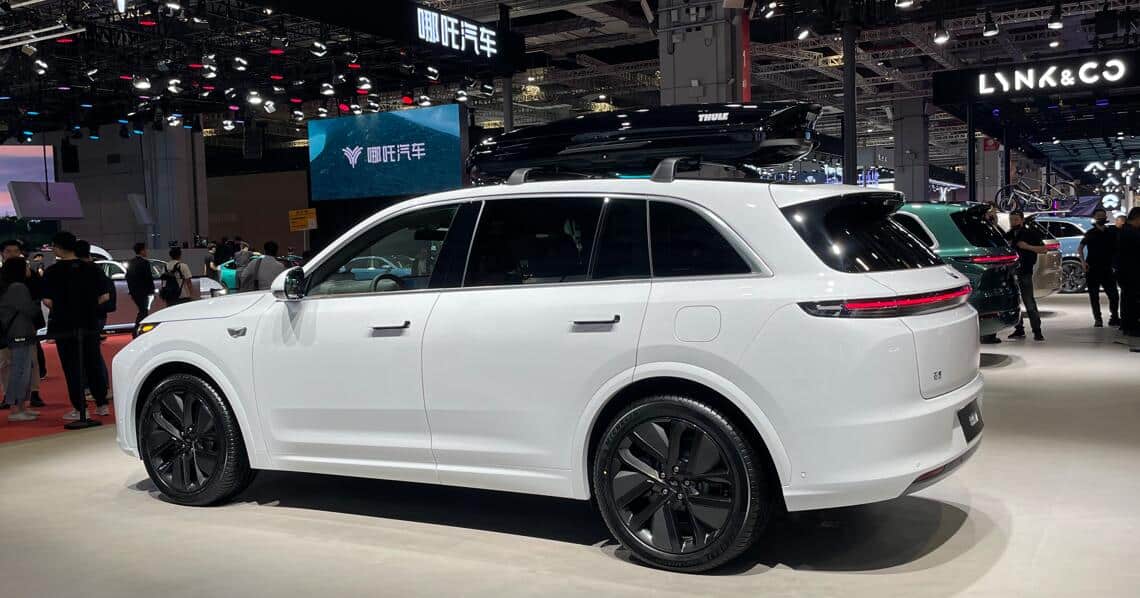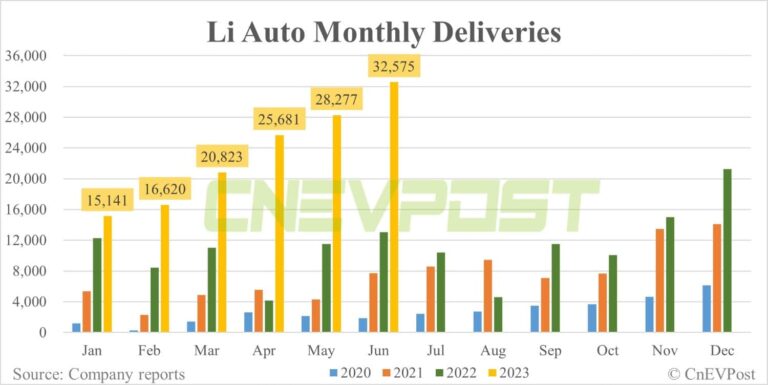Nio has given its supply chain a full-year sales forecast of 240,000 units, according to local media.
(Image credit: CnEVPost)
Li Auto (NASDAQ: LI) has updated its second-half sales forecast after seeing strong growth in the first half of the year, a new report said.
Li Auto has told its supply chain that it is raising its second-half sales forecast to about 240,300 units, local media outlet 36kr reported today.
The extended-range electric vehicle (EREV) maker expects average monthly sales of more than 35,000 units in the third quarter and more than 42,000 units in the fourth quarter, according to the report.
Li Auto is on track to see sales of more than 380,000 units for the full year, far exceeding the 300,000 sales target set at the beginning of the year, considering it delivered 139,000 units in the first half of the year, according to the report.
Li Auto's three SUVs currently on sale -- the Li L7, Li L8 and Li L9 -- are all EREVs, which are essentially plug-in hybrids aimed at a larger market than pure electric vehicles.
In June, Li Auto delivered 32,575 vehicles, bringing first-half deliveries to 139,117 units, up 130.31 percent year-on-year, according to data released earlier this month.
Last week -- June 26 to July 2 -- Li Auto sold 6,500 units, down 13.33 percent from 7,500 units the week before, according to data shared by the company yesterday.
The drop in sales last week was due to its factory being closed for two days during the week of the Dragon Boat Festival, one more day than normal, resulting in 6,388 units produced that week, Li Auto founder, chairman and CEO Li Xiang said on Weibo yesterday.
This year's Dragon Boat Festival holiday was from June 22 to June 24.
Li Auto's current vehicles are produced at its factory in Changzhou, Jiangsu province, which Li previously mentioned has six days of production per week as well as one day of overhaul.
A total of 7,500 vehicles per week is the limit of Li Auto's current production, and the reduced production from the holiday was reflected in last week's deliveries, he said.
Starting in the second week of July, Li Auto will increase its weekly production capacity from 7,500 to 8,000 units, and the change in deliveries from this will come in the third and fourth weeks of July, he said.
Late last month, a 36kr report said Li Auto had raised its full-year sales target to 400,000 units from the original 300,000, but this was later denied by Li.
Li Auto finished the first half of the year with more than 130,000 units sold and does not have any ability to make it to 400,000 units for the full year, he said at the time.
Li Auto's battery-electric vehicle (BEVs)-focused local peers Nio (NYSE: NIO) and Xpeng (NYSE: XPEV) have both largely completed product switches recently and are expected to see higher sales in the second half of the year.
Nio has given its supply chain a full-year sales forecast of 240,000 units, the 36kr report said today.
Nio management has previously said the company was aiming to double its sales this year compared to last year. It sold 122,486 vehicles last year and sold 54,561 vehicles in the first half of this year.
Nio will need to sell an average of at least 31,000 vehicles per month in the second half of the year if it is to achieve full-year sales of 240,000 vehicles.
Xpeng has previously mentioned that the goal is to see cumulative deliveries of more than 450,000 vehicles by the end of this year, implying a sales target of about 200,000 vehicles this year.
The company has seen weak sales over the past year, though deliveries have been improving month by month so far this year, with 8,620 vehicles delivered in June.
Xpeng delivered 41,435 vehicles in the first half of the year, and to see full deliveries reach 200,000 would mean it would need to deliver an average of more than 26,000 vehicles per month in the second half.
Xpeng officially launched its new SUV, the G6, on June 29, and its chairman and CEO, He Xiaopeng, said the monthly sales target for the model is at least 10,000 units.

